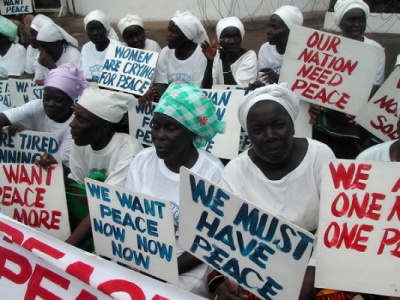Difference between revisions of "Civil War in Liberia"
(Created page with "=== 1989-96/1999-2003 === 400px|thumbnail|left In 1989 the National Patriotic Front of Liberia (NPFL) led by Charles Taylor rebelled against Samuel Doe?s...") |
|||
| Line 2: | Line 2: | ||
[[File:1989-96.jpg|400px|thumbnail|left]] | [[File:1989-96.jpg|400px|thumbnail|left]] | ||
| − | In 1989 the National Patriotic Front of Liberia (NPFL) led by Charles Taylor rebelled against Samuel Doe?s violent and repressive dictatorship. Doe was killed in 1990 and the Economic Community of West African States (ECOWAS) established an interim government. Despite a ceasefire agreement signed in Bamako, Mali, in 1990, Taylor refused to negotiate with the new government, and thus, the civil war did not end. Instead the conflict deepened, with seven warring factions are now involved. In 1996, Nigeria and other West African states drafted a ceasefire. After considerable peace efforts conducted by the United States, United Nations, Organisation of African Unity, and the (ECOWAS), peace and disarmament were negotiated and elections were held, with Taylor emerging as the winner. Opposition to Taylor?s government emerged soon after and consequently, a second Civil War started in 1999. This conflict was ended in October 2003 by the ECOWAS peacekeeping forces (ECOMIL), which stopped the rebel siege of Monrovia. Charles Taylor was granted safe exile in Nigeria until his arrest in 2006, and trial in the UN-backed Special Court for Sierra Leone. | + | In 1989 the National Patriotic Front of Liberia (NPFL) led by Charles Taylor rebelled against Samuel Doe?s violent and repressive dictatorship. Doe was killed in 1990 and the Economic Community of West African States (ECOWAS) established an interim government. Despite a ceasefire agreement signed in Bamako, Mali, in 1990, Taylor refused to negotiate with the new government, and thus, the civil war did not end. Instead the conflict deepened, with seven warring factions are now involved. In 1996, Nigeria and other West African states drafted a ceasefire. After considerable peace efforts conducted by the United States, United Nations, Organisation of African Unity, and the (ECOWAS), peace and disarmament were negotiated and elections were held, with Taylor emerging as the winner. Opposition to Taylor?s government emerged soon after and consequently, a second Civil War started in 1999. This conflict was ended in October 2003 by the ECOWAS [[peacekeeping]] forces (ECOMIL), which stopped the rebel siege of Monrovia. Charles Taylor was granted safe exile in Nigeria until his arrest in 2006, and trial in the UN-backed Special Court for Sierra Leone. |
[[Category:Peacebuilding and Reconciliation]] | [[Category:Peacebuilding and Reconciliation]] | ||
Revision as of 09:37, 1 April 2014
1989-96/1999-2003
In 1989 the National Patriotic Front of Liberia (NPFL) led by Charles Taylor rebelled against Samuel Doe?s violent and repressive dictatorship. Doe was killed in 1990 and the Economic Community of West African States (ECOWAS) established an interim government. Despite a ceasefire agreement signed in Bamako, Mali, in 1990, Taylor refused to negotiate with the new government, and thus, the civil war did not end. Instead the conflict deepened, with seven warring factions are now involved. In 1996, Nigeria and other West African states drafted a ceasefire. After considerable peace efforts conducted by the United States, United Nations, Organisation of African Unity, and the (ECOWAS), peace and disarmament were negotiated and elections were held, with Taylor emerging as the winner. Opposition to Taylor?s government emerged soon after and consequently, a second Civil War started in 1999. This conflict was ended in October 2003 by the ECOWAS peacekeeping forces (ECOMIL), which stopped the rebel siege of Monrovia. Charles Taylor was granted safe exile in Nigeria until his arrest in 2006, and trial in the UN-backed Special Court for Sierra Leone.
